Story highlights
A court battle about Kentucky's only abortion clinic is in progress
Women in Central Appalachia, hours away from the clinic, worry about other matters
They are stepping up to fight for basics, like birth control and sex ed access
Perhaps it was the abstinence pledge she felt forced to sign or the promise ring she was told to slip on her finger. But from the moment Cheryl became sexually active, she felt dirty.
Then, three boys raped her, reducing her self-image to mud.
She didn’t dare tell anyone or seek help. Growing up in rural eastern Kentucky, she’d been raised by drug addicts who’d lost the family home and lived in a place, she says, where there was “nothing left to do but do each other.”
Shame kept Cheryl, who wants to be identified only by a pseudonym, from even stepping foot into her hometown’s health department. A year of untreated chlamydia stole her fertility.
“I wish I hadn’t been so scared,” says Cheryl, now 20 and a University of Pikeville student who hopes to be an attorney someday. “I will never be able to have a family. I wish the way I’d learned about my own body and sex in general had been different.”
Here, where the Bible Belt cinches tight around Central Appalachia and small-town living means everyone knows your business, matters of sexuality and reproductive health are traditionally talked about in whispers – if they’re talked about at all.
But pull back the kudzu, and you’ll hear voices crying out for change, even as the political winds howl against them.
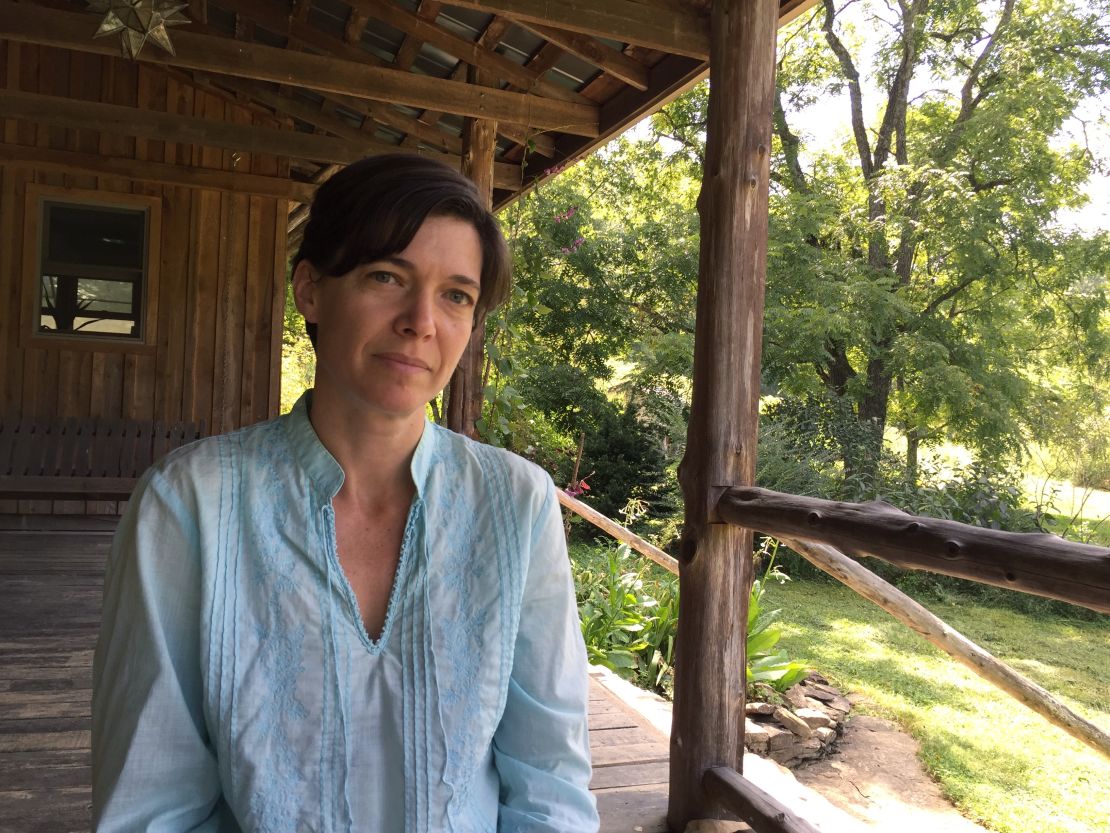
Gov. Matt Bevin, they say, is hell-bent on outlawing abortion. Under him, state officials are threatening to close Kentucky’s only abortion clinic. And though a pre-abortion ultrasound requirement was recently struck down, Bevin signed into law a ban on abortions after 20 weeks. Meantime, the Trump administration has rolled back Obamacare’s contraceptive coverage requirement and proposed a budget that would cut programs to prevent teen pregnancy – while sinking millions more into abstinence-only education.
In the face of all of this, there are women in eastern Kentucky rising up to do what others won’t do for them. Through activism and art, radio shows and bootleg sex ed classes, they are taking a stand for their communities and families, and for every young Cheryl out there.
As deep as the ‘hollers’
Near a stone bridge that crosses the North Fork of the Kentucky River in the quaint town of Whitesburg, a group gathers in a space usually reserved for youth programs and punk rock shows. They are here to embark on a bold mission, one that is so new, they ask me to leave before they get to work.
The dozen or so who stream in are from Whitesburg and nearby towns, the big city of Lexington and even the nation’s capital.
Their goal? To launch a comprehensive birth-control access campaign in southeastern Kentucky, where teen birth rates outpace the national average.
In walks a woman who remembers classmates who got pregnant before they reached high school. Here comes another who likes to say it’s easier to get pain pills in these parts than some forms of birth control. A third works on the front lines to ensure abortion access.
Abortion has put Kentucky in the national spotlight. If its last abortion clinic, based in Louisville, closes, the Bluegrass State would be the first in the nation to effectively ban the procedure since it was legalized in 1973.
But here in this easternmost part of the state, hundreds of miles from Louisville, a court battle over the clinic’s fate is hardly top of mind. Many people I meet while traversing the region aren’t even aware this fight is happening.
Medical professionals can count on one hand the times they’ve been asked about abortions. Women who’ve had abortions rarely, if ever, mention it. For many, the clinic might as well be in Las Vegas. If you don’t have the means to get to Louisville – let alone pay for the procedure, lodging and child care – what difference does it make if there’s no abortion clinic in the state?
What can make a difference in tackling unplanned and unwanted pregnancies are more conversations about – and more access to – birth control, reproductive health care and sex ed. But the challenges in opening up these discussions run as deep as the “hollers,” or valleys, that cut through these green hills.
‘The whole town knew’
Outsiders often imagine this area in black and white, a place where poverty blankets the land much like the fog that hangs in the morning air. But the reality bursts with color – and people who defy expectations.
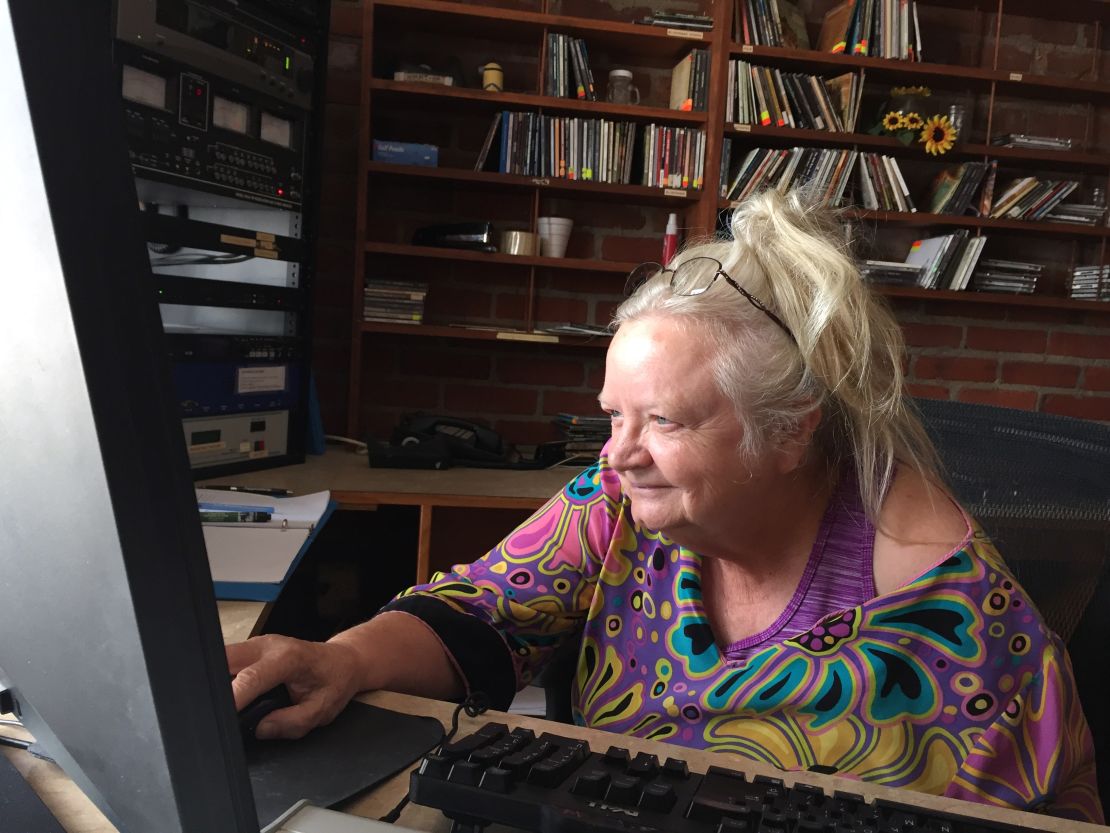
Tattooed on Stacie Sexton’s left shoulder are the longitude and latitude of Whitesburg, where she was born and raised until she moved to nearby Hazard as a tween. She lives in Lexington now but never forgets where she’s from. She recalls the abstinence-only education she got in grade school and how two of the seven girls in her class got pregnant before the end of eighth grade. One miscarried; the other married.
She’d just turned 20 when a nurse at the health department confirmed that she was pregnant and insisted that she make a prenatal care appointment. With the start of college around the bend, she had other plans: She traveled more than 150 miles to Knoxville, Tennessee, for an abortion.
When someone from the health department called because she’d missed her appointment, Sexton was honest about what she’d done. “The whole town knew within a few days,” she says, privacy laws “be damned.”
Today, at 32, she’s a force for change. She recently organized the first “Abortion Monologues” in Lexington, providing a stage for women and men to share their stories while trying to increase empathy and erase stigma.
But it’s her full-time job at the Kentucky Health Justice Network that brings her back to Whitesburg this evening to steer the group committed to promoting birth control access.
She directs the new project, All Access EKY, which is loosely modeled after a successful Colorado initiative. Between 2009 and 2014, with the help of a private funder, Colorado managed to cut births and abortions by about 50% among teens and 20% among women between 20 and 24, while saving the state nearly $70 million in public assistance.
With funding from the Educational Foundation of America, All Access EKY aims to increase access to and demand for birth control, including long-acting reversible options like IUDs and implants – the sorts of contraceptives that can be hard to come by here.
We’re “still having to fight all these negative stereotypes of being barefoot and pregnant,” Sexton says. “We do have a problem, but people would be receptive to these options if they had them.”
Across Kentucky, 47% of pregnancies are unplanned, costing the state $75 million and the federal government nearly $303 million a year. This is according to the latest figures culled by the Guttmacher Institute, a leading research and policy organization focused on sexual and reproductive health.
In Appalachian Kentucky, the teen birth rate is 68% higher than the country and 34% higher than the rest of the state, according to a report by several groups, including the Appalachian Regional Commission.
All Access EKY wants to shape a new reality through coalition building, education, legislation and storytelling.
A hardscrabble history
Signs pointing to churches dot the roadways. So do alerts for blasting zones and fallen rock, where the long-dying coal industry gasps for breath.
To understand how women have experienced this region, it helps to know a bit about the hardscrabble history of where they’re from.
The area has long been defined by coal. But the truth is, since automation took hold after World War II, mining has been on its way out. The “boom and bust” business that displaced millions of people has been dying for decades, says Dee Davis, founder and president of Whitesburg’s Center for Rural Strategies, who has lived in and studied this area for most of his 66 years.
“I don’t think anyone thinks that the coal industry is coming back,” he says, though some may still hope for it. “I may hope that Scarlett Johansson is going to come into my office, give me a kiss and ask me to run away with her, but it’s not going to happen.”
A lack of alternatives forced plenty of people to move elsewhere, but for many who’ve stayed, the connection is too strong to imagine leaving.
Davis talks about the lush hills that sustain him, the crows that chase away hawks in “a big movie in the sky,” the memories of the grandmother with bodybuilder arms who taught him to skip rocks across the creek bed.

The women I meet speak about their dozens of cousins, the generations that root them here, the gardening, fiddling and quilting that courses through their “mountain woman” veins. One stands on her office porch; behind her is a painting of a quilt design made by her grandmother, who died in February at age 99. Before she was buried, the family slipped something into her pocket: bean seeds that had been in the family for nearly 200 years.
This is an area where strong women have been slow to get pap smears and mammograms or tend to their general health. It’s also a state where 76 out of 120 counties don’t have an OB-GYN, according to a 2014 report by the American Congress of Obstetricians and Gynecologists.
With the arrival of Obamacare and the expansion of Medicaid, Dr. Jessica Branham says, the situation has started to change.
Branham, an OB-GYN in nearby Floyd County, says she’s seen patients who haven’t sought reproductive care in 10, 15, 20 years. So beyond gynecological exams, she’s talking to them about advances in birth control.
Many women here are still haunted by “the ghost of the Dalkon Shield,” she says, the flawed and dangerous intrauterine device that went on the market in the 1970s. But even if she persuades them to trust what’s new, she can’t always deliver.
If an IUD is approved by insurance, it’s often on a “buy and bill” basis, meaning the patient must pay for it up-front, she says. At $600 to $800 a pop, she says, that’s usually a deal-breaker.
This means that for a woman experiencing heavy bleeding, it can be easier to get a hysterectomy, which is covered by insurance, than it is to manage the problem with a simple form of birth control, she says.
“The algorithms of who gets what, I will never understand,” Branham says.
Bridging the disconnect
Sexton, of All Access EKY, says women of all ages should know that their contraceptive options extend beyond abstinence, the pill and condoms – and that what works for one person may not work for another.
But just getting them to walk into a health department can be a challenge when the person behind the counter or in the exam room might be a neighbor or fellow church member.
If a woman gets through the door, she should be informed enough to know what options to ask for – and hope the one she wants is available, says Sexton.
All Access EKY is focusing on 10 counties in southeastern Kentucky. Of the clinics in those counties, only a third offer the full range of contraceptive methods, according to Power to Decide, a national nonprofit working to prevent unplanned pregnancies.
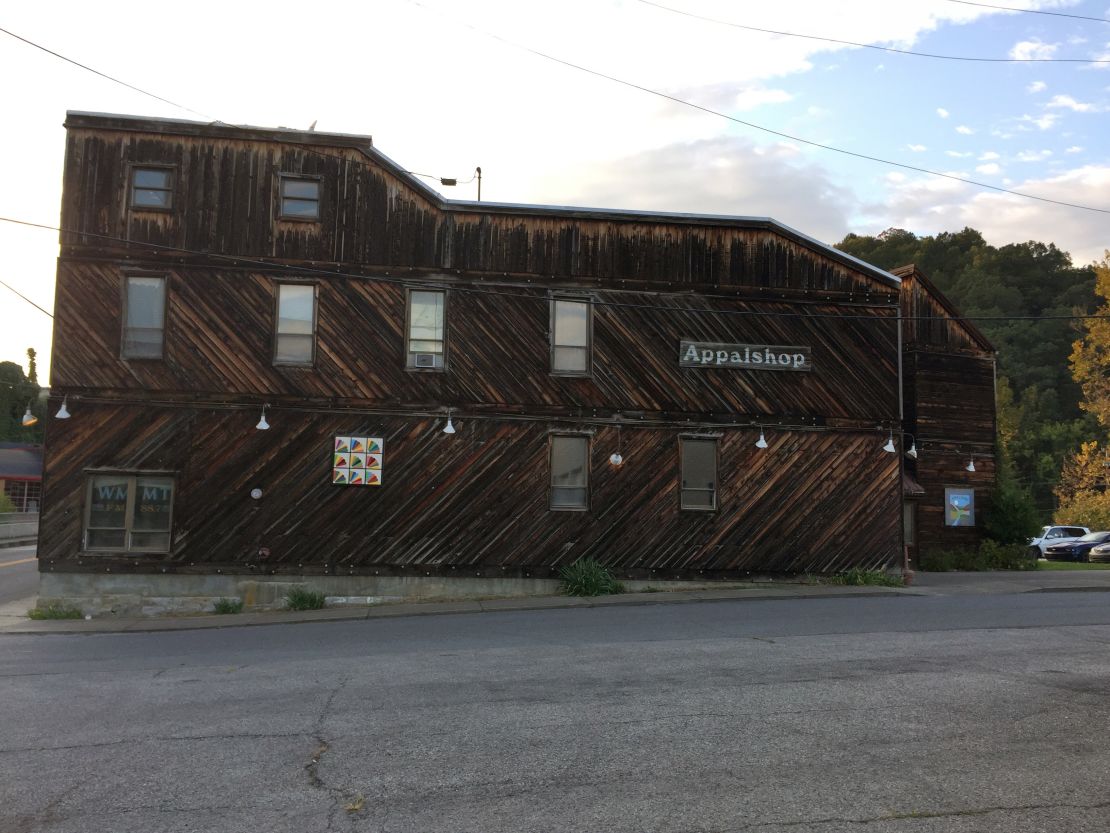
Complicating matters further: Not enough people in the region are trained to insert IUDs or implants, which often means an additional wait.
“If you have to make people wait, they’re not going to do it,” Sexton says. “And that doesn’t matter if you’re in eastern Kentucky or Los Angeles.”
To battle these barriers, Sexton says, the project is asking for help from health departments, state lawmakers, educators and community leaders. But recruiting support will take time.
“There’s a disconnect between what people think we do and what we do,” she says of her group’s work. The words “birth control” are immediately associated with “liberal thoughts and people having sex willy-nilly. And, really, our goal is helping people control their futures.”
One person helping get the word out is Willa Johnson. She thinks about her peers who married young because they got pregnant and felt that they had no choice – only to get divorced young, too.
Johnson, who lives in Whitesburg, is 32, single and fosters a toddler. She also works at Appalshop, a cultural and media hub housed in a rustic wooden structure that serves as a mouthpiece for Appalachian voices and ideas. Appalshop has been an institution in Whitesburg for nearly half a century and, along with Power to Decide, is a partner in All Access EKY.
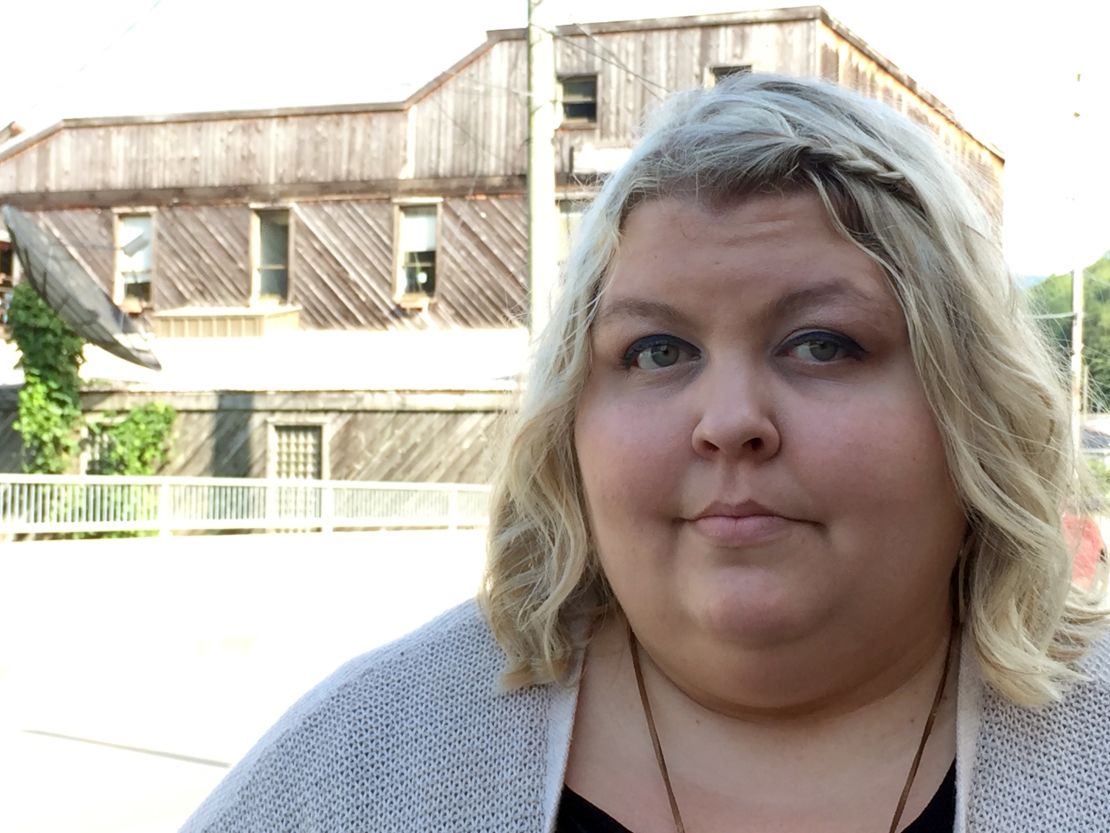
With the help of five young women Johnson recently hired – two high school seniors and three college students – her team is building a website and producing stories that will speak to people in this region.
Among their projects are a radio essay about being denied birth control because of religious beliefs, a conversation with a high school principal about how schools deal with teen pregnancies, and video interviews with doctors serving the area.
“We want to share stories and experiences to break down this idea that we can’t talk about access to birth control,” Johnson says. “I want the community to hear that there are others having these conversations. I want them pushed out of their comfort zone.”
Learning about the ‘P-I-L-L’
Down the road, past the health department and a craft moonshine distillery, this sort of openness about sex is foreign to the senior women I meet at the recreation center.
They’re playing cards and don’t stop dealing or looking at their hands to talk.
“Mommy said babies came in suitcases,” says one woman, who didn’t learn about sex until she got married.
“When I started my monthlies, I was scared to death,” says another, who raced to her school’s principal’s office when she first got her period.
“We don’t believe in abortion,” announces a third, when the word is first mentioned.
Wilma Ritchie, 77, a mother of eight, is less absolute. She talks about her own daughter, who was advised by a doctor to have an abortion. Her daughter refused; the baby died as soon as it was born.
“She lost another one like that,” Ritchie says. “It lived an hour or two.”
When her friends say they don’t want to see abortion in Kentucky, Ritchie at first keeps her mouth shut. Then she answers quietly, almost under her breath, “I don’t think it’s right, but if a woman’s life is at risk, well …”
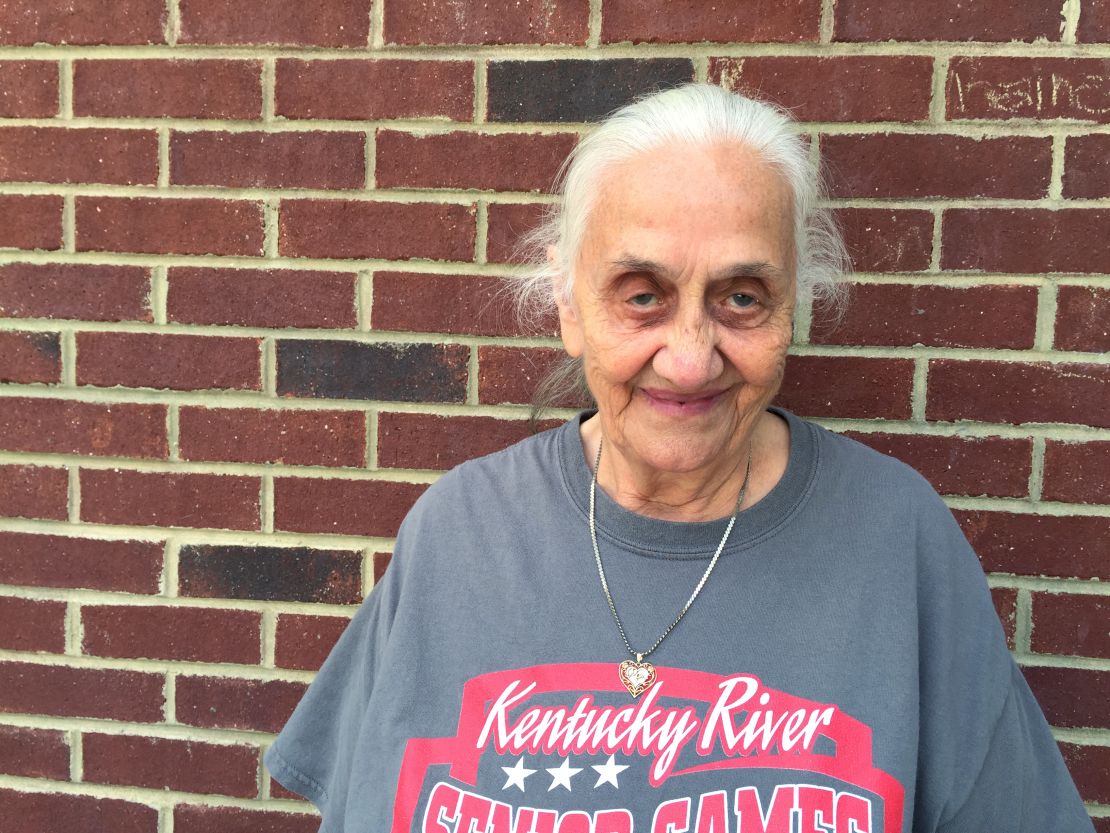
These women were taught to mind their parents and not have sex until they were married. They worked hard to care for their own, which is why the scourge of drugs, a reliance on government programs and the fact that babies are being passed off to foster homes and grandparents make some of them shake their heads.
But while these women largely represent the way it was, over at community radio station WMMT, located at Appalshop, Zelma Forbes proves that there have always been exceptions.
She’s a 71-year-old community college math instructor who doubles as “Sweet Tater,” the name she uses each week during her two-hour radio program dedicated to Old Appalachian music.
Forbes, who was married once for 10 years, presses play so Sheila Kay Adams can sing, “I wish I was a single girl again, Lord, Lord, don’t I wish I was a single girl again.”
Off-mic, Forbes shares her own story, which includes plenty of zingers.
“He didn’t like me,” she says of her ex-husband from half a lifetime ago “And that’s OK. I didn’t like him, either.”
No one had to teach her about sex. Growing up on a farm in Greenup County to the north, watching the animals taught her plenty. Her older sisters filled her in on details like menstruation. Always curious, she dug deeper, flipping through biology books.
She was in high school and college in the ’60s, when friends had abortions before it was legal. One time, using leftover financial aid money, she helped pay for a friend’s procedure. She says she knew all about the “P-I-L-L and D-I-V-O-R-C-E” because “Loretta Lynn sang about it.”
She’s now a mother of three: two her own, one adopted from her daughter when she was hooked on drugs (she’s quick to point out that her daughter is now sober). She wishes sex wasn’t taken so lightly. If birth control was readily available, there would not be the same need for abortions, she says. But she’s a realist too, which is why she says the choice to get an abortion in Kentucky should remain.
She’s unusual for her generation, and she knows it.
“Women in this area,” she says, “are not encouraged to be forceful.”
‘Too political’ for school
That may be traditionally true, but Tanya Turner, 31, is among those women determined to blaze a new path.
Like “Sweet Tater,” she takes to the community radio airwaves with her WMMT program, “Feminist Friday.”
Turner is also the brains behind what she likes to call “Sexy Sex Ed,” an occasional workshop to bring honest conversations to young people to fill the void left behind by homes and schools.
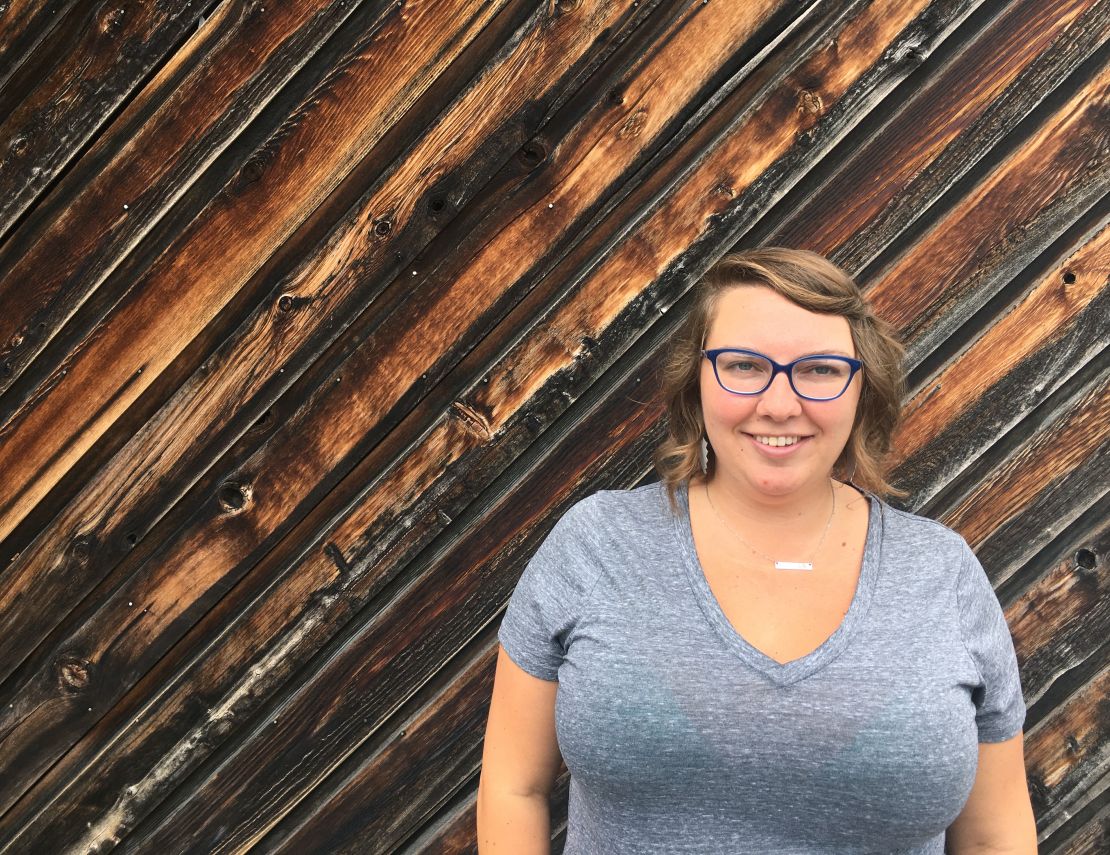
She wishes the United States would follow the lead of countries like Sweden, where age-appropriate sex education starts in kindergarten. If left to their own devices, she warns, kids will Google answers to even the most innocent questions and enter the depths of online porn.
She used to run an online program for 21 school districts but quit after attending a reproductive rights rally at the state Capitol. She wanted to write about the experience and was told she could as long as she didn’t include the words “birth control” or “sex ed.”
Those words were seen as “too political,” she says. “It felt like a gag order to not be able to say those words at this unprecedented time.”
Children and young adults need safe spaces to talk, she says.They should understand the importance of consent and the way their bodies work. She need only think about the young people who’ve shown up, including the six transgender students who joined her for a sex ed workshop this year, to know that the hunger for authentic conversation is real.
Though her full-time job now is to raise money for Appalshop, she organizes sex ed programs when she can and draws a steady flow of participants – which often includes chaperones and parents who have plenty to learn, too.
“I’ll say, ‘If this gets to be too much, you may want to leave.’ But no one will leave,” she says. “I get 40-year-olds thanking me.”
Quiet no more
The scenes laid out around Lindsey Windland are supposed to make viewers uncomfortable: hands holding a knitting needle, a screwdriver and a bottle of poison. A female saint dressed in red, clutching a coat hanger.
They’re textile pieces Windland created after researching the desperate measures women took before Roe v. Wade legalized abortion in the country.
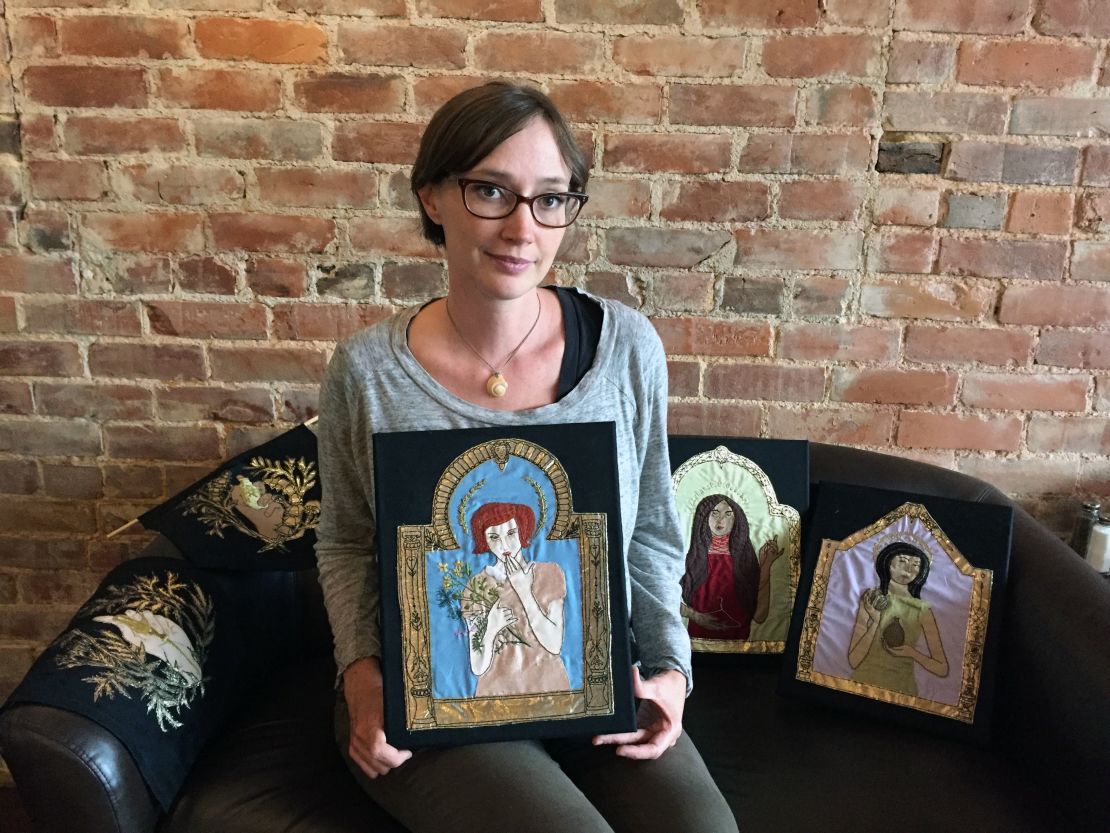
Windland’s grandmother taught her to sew, a skill passed down in a region known for its quilting heritage. A mother and small-business owner in Madison County, she says that her latest work is part of her effort to “take back the idea that embroidery was something to keep women quiet, docile and sitting down.”
She’s one of two artists I met in the foothills of Appalachia who are using their crafts to send a message about reproductive health. Both were given grants by the Kentucky Foundation for Women, which supports feminist artists who hope to inspire social change.
Windland, 33, is grateful that she’s never had to think about having an abortion. But she took on the subject after the election of Kentucky’s anti-abortion governorin 2015.
“When Bevin came into office, I was feeling overwhelmed,” she says. “I understand people’s religious beliefs, but they need to understand that women can resort to things that make them die.”
One of her pieces hung in a local art show, but it wasn’t well-attended, she says. In February, though, the whole series will be on display in a Louisville gallery – the first that was willing to show them after others turned her work down. Before then, she says, she’d like to add one more to the collection: a piece that illustrates how far women in Kentucky need to travel for abortions.
She hopes the series will spark conversations and shape attitudes.
“Just because it is really difficult for women to obtain abortions in our state, it doesn’t mean they won’t try to do it themselves or go somewhere else to have it done,” Windland says. “A safe surgical alternative exists, and we should utilize it.”
Farther to north, on her farm in Nicholas County, Arwen Donahue is writing and illustrating a graphic novel based in part on her own abortion.
She was 40 when she suddenly found herself pregnant. She and her husband already had one child, never intended to have another and were struggling with their farm and finances.
The decision to have an abortion was painful enough, she says. But adding to the weight was a feeling that she couldn’t tell anyone beyond her mother and a couple of close friends.
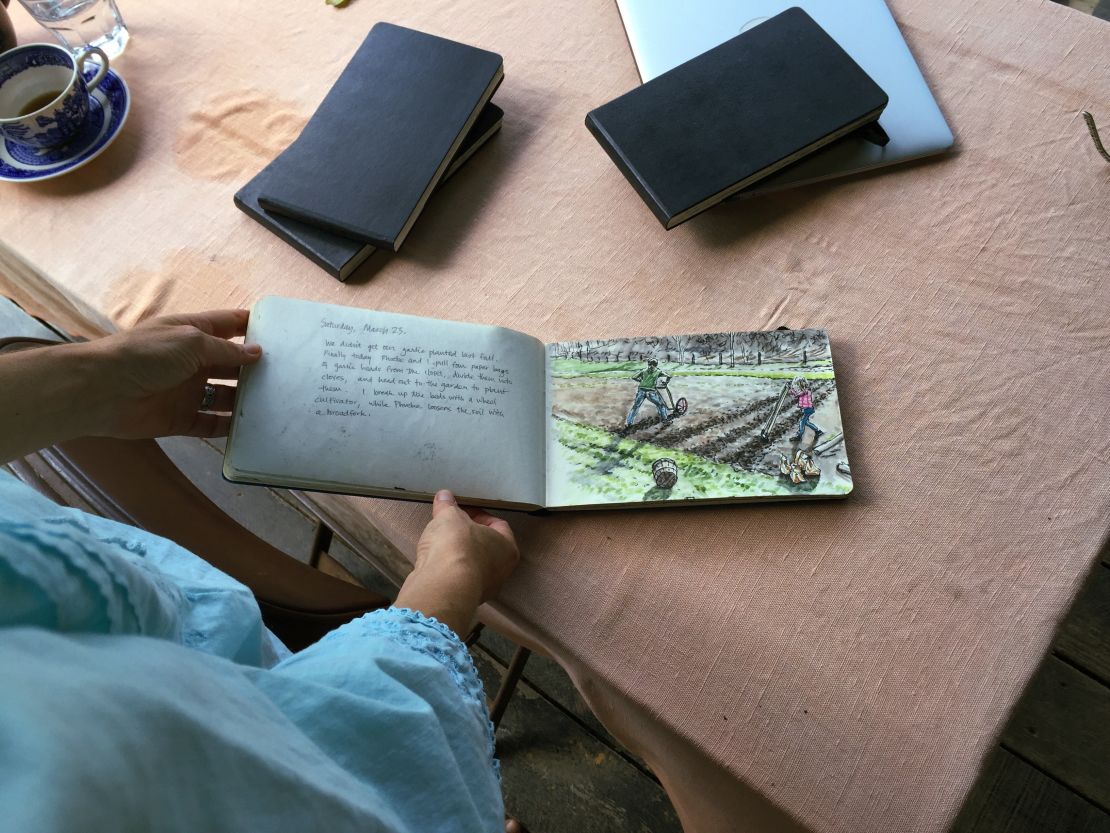
“I felt like I was surrounded by people who’d think I was a monster,” says Donahue, now 48. She grew up in more urban and liberal areas of America but has called this farm home for 20 years.
“There is this unspoken cultural assumption that there are some things you do and some things you don’t do. One thing you don’t do is have an abortion if you’re in a stable marriage, and the second thing you don’t do is talk about it.”
The self-imposed shame and silence takes a toll, she says, and further isolates rural women who are already cut off.
So she’s working on telling her story about choices, reproduction and motherhood. Her graphic novel will weave together the narratives of three years in her life, including 2010, the year she had an abortion. Though she plans to eventually publish it as a book, she’s releasing pieces on Rumpus, an online literary magazine.
Donahue is motivated to share her experiences, she says, in part for those who can’t. She speaks up on behalf of rural women whose stories are too often overlooked or misunderstood.
“I’m really glad to put my shoulder to the wheel on this issue and feel that it’s time,” she says.
A ‘revolution’ stirs
The abstinence pledge and promise ring didn’t keep Cheryl from becoming sexually active. They didn’t protect her from being gang-raped. And they didn’t prevent the loss of her fertility.
But Cheryl knows that she isn’t alone.
She’s not an activist or artist and has never heard of All Access EKY. Instead, she’s part of a generation of eastern Kentuckians trying to reconcile what they’ve been taught with what they’ve lived and what they hope to be.
She tells her story in the chapel at the University of Pikeville, 45 minutes up the road from Whitesburg, surrounded by other women who’ve gathered to discuss their own coming-of-age tales in Central Appalachia.
Most are first-generation college students. They compare stories of parents and siblings who’ve struggled with addiction. One speaks of the crowded day care center in her high school, the friends who’ve all married young and have children.
Two single mothers speak of the sacrifices they’ve made to give their children a better life and the abusive husbands they’ve left behind. One of them, a mother of four in her late 20s, announces amid tears that she signed divorce papers the day before, prompting the room to erupt in applause.
Not one of the women in the chapel knew that Kentucky has only one abortion clinic, nor did they know that it may close. The news startles and angers them.
“If you take that option away, it’ll make room for people to do it on their own,” says one.
“If they want an abortion, they’re going to get it,” says another.
In this space, where their names are protected, they openly tell stories of women they know who’ve had abortions. The cousin who is an alcoholic and needs to grow up before she can raise children. The struggling sister who didn’t want to bring another drug-addicted baby into the world. The friend who simply trusted that it was the best decision for her at the time.
Join the conversation
On campus, though, they fear that they’re a minority, which is why they usually keep their feelings to themselves.
“If you say you’re pro-choice, you’re the devil,” one student says.
But a professor in the room then tells them a story. She talks about the students who’ve railed against abortions in the classroom, only to seek her out later to say they feel like hypocrites because they’ve had abortions themselves.
The students let this soak in. Maybe they aren’t so alone in their feelings. Maybe, as they pursue their dreams and lives in eastern Kentucky, they can be part of something bigger.
“If we get enough young people who really care,” says one, “our generation will be the revolution.”




